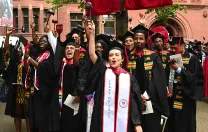As prepared for delivery.
Distantia Propinquior
ORATIO SALVTATORIA CANTABRIGIÆ NOV-ANGLORVM IN COMITIIS ACADEMICIS HABITA A. D. X. KAL. IVN. ANN. DOM. MMXXIV. REIPVB. AMERICANÆ CCXLVIII. COLL. HARV. CCCLXXXVIII.
AVete, Praeses Garber, clarissimi decani, sapientes professores, dilectae familiae, amici, hospites, condiscipuli, omnes toto in mundo—auete, sodales!
Hodie mihi est magnus honor huius orationis uobis enuntiandae in lingua tam antiqua, illustri, et erudita, quae uerborum superfluorum ut yes et no omnino caret et pluribus uestrum ornamentum pulcherrimum est iuxta interpretationem anglicam quam quidem legitis. Spatium inter has duas textus columnas breuius esse non potest, sed distantia non potest esse maior.
Nos, huius anno MMXXIV ordinis studentes, similem distantiam aduertimus primo in campum aduenientes, itaque primi studentes Haruardiani facti sumus quibus nulla memoria est de uita Haruardiana ante pestilentiam. Nobis in cubiculis singillatim inclusis ut monachi in cellulis suis campus Haruardianus uacuus manebat silentio perturbato modo a susurris festinantibus inter duos uel—eheu!—tres studentes congregantes in scalis Bibliothecae VVideneris. Quis autem possit obliuisci memorabilia festa habita Zooma cum yauune? In quibus ridiculae scaenae nos repraesentabant et facies nostrae figuras animalium pictorum sumebant. Innumerabiles inter nos textus commutauimus de praeceptis nostris, sed ubi tempus eorum scribendorum adfuerat, solitudo scripturae nostrae comparari poterat cum ea Boethi, Consolationis Philosophiae scriptoris, carnifice imminente in carceris—licet altiorem philosophiam exhiberent nostri tractatus Scripturae Expositoriae, et poenae quae penderent super capitibus nostris multo terribiliores essent. In his multis aliisque modis spatium inter nos breuius esse non poterat, sed distantia non poterat esse maior.
His difficultatibus non obstantibus mirabile uisu quam fortem amicitiam noster ordo habeat. Etiamsi nostrae conuersandi artes leuiter sunt nutritae, una cum ceteris lente et inconcinne eas struximus. Etiamsi nunquam occasionem habuimus coniungendarum quarundam sodalitatum quae ante pestilentiam erant, nouas nostras condidimus, ementes etiam, ut sodalitates essent domo similes, catulos amabiles. Experientia nobis ostendit plane: contra quascumque improuisas difficultates nos bene instructos esse, mutuo auxilio nitentes, ad inueniendas uias nouas, insolitas, saepius legitimas, atque omnium audacissimas. Totus mundus exspectatione maxima uidet quid hinc faciamus; gaudeamus igitur. Auete atque ualete!
A Nearer Distance
A SALUTATORY ORATION DELIVERED IN CAMBRIDGE OF NEW ENGLAND AT THE UNIVERSITY’S COMMENCEMENT ON THE 23RD DAY OF MAY IN THE YEAR OF OUR LORD 2024 OF THE UNITED STATES THE 248TH AND OF HARVARD COLLEGE THE 388TH
Welcome, President Garber, eminent deans, wise professors, beloved family, friends, guests, peers, everyone everywhere in the world—welcome, companions!
Today, it is my great honor to deliver you this oration in so ancient, esteemed, and scholarly a tongue, which utterly lacks needless words like “yes” and “no” and serves for most of you as a gorgeous decoration beside the English translation from which you’re actually reading. The space between these two columns of text could not be any shorter, but the distance could not be any greater.
We members of the class of 2024 were faced with a similar distance when we first arrived on campus and are thus the first Harvard class with no knowledge of what Harvard life was like before the pandemic. As each of us was locked individually in our rooms like monks in their cells, Harvard Yard remained eerily empty, the silence broken only by harried whispers exchanged between two or—oh, woe!—three students gathering on the steps of Widener Library. But who could neglect the unforgettable parties we held Zooma cum yawne? There, creative backgrounds displayed our personalities and our faces took the forms of cartoon animals. We exchanged countless texts regarding upcoming assignments, yet when the time came to actually write them, the solitude of our writing could be compared to that of Boethius, author of the Consolation of Philosophy, as he sat in prison awaiting his execution—although clearly the Expository Writing papers which we drafted were of more philosophical depth, and the consequences which hung over our heads were far more dire. In these and many other ways, the space between us could not have been any shorter, but the distance could not have been any greater.
In spite of these challenges, it is marvelous to see how strong an identity our class shares. Even if our social skills are slightly undeveloped, we have slowly and awkwardly built them up with one another. Even if we never got the chance to join certain student organizations which existed before the pandemic, we’ve created new ones of our own, and to make our orgs feel more like home, we’ve even purchased adorable puppies for them. Our experiences have clearly shown us that in spite of any unforeseen challenges at all, we are well equipped, relying each other’s help, to find new, creative, usually legal, and, above all, exciting paths forward. The whole world is watching with the greatest anticipation what we do from here, so let’s celebrate. Goodbye, and farewell!






